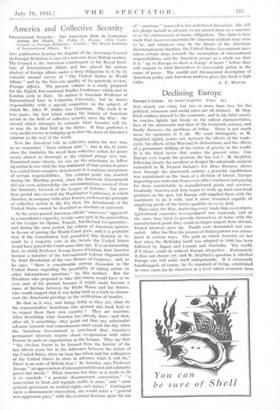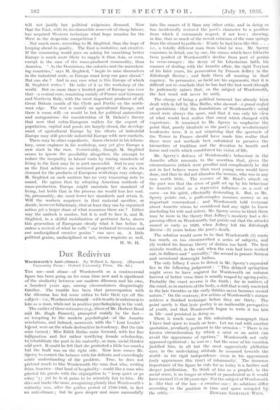Declining Europe
Europe's Crisis. By Andr6 Siegfried. (Cape. 5s.) NOT merely one crisis, but two or more than two, for the political, economic and social crises are all distinct. M. Sieg- fried confines himself to the economic, and in his brief survey he touches lightly but firmly on the salient characteristics, first of the nineteenth and then of the twentieth century, and finally discusses the problems of today. There is not much room for optimism in it all. We must distinguish, as M. Siegfried rightly points out, between the effects of the trade- cycle, the effects of the War and its dislocations, and the effects of a permanent shifting of the centre of gravity in the world. It is the third factor that makes the gravest crisis. Can Europe ever regain the position she has lost ? M. Siegfried, following closely (by accident or design) the admirable analysis embodied in M. Francis Delaisi's Les Deux Europes, shows how through the nineteenth century a peaceful equilibrium was maintained on the basis of a division of labour, Europe importing raw materials from every other continent and paying for them comfortably in manufactured goods and services. Gradually America and Asia began to work up their own local products on the spot, but Europe still supplied them with the machinery to do it with, and it alone remained capable of supplying goods of the better qualities in every field.
Then came the War, shattering every trade-link everywhere. Agricultural countries over-produced raw materials, and at the same time tried to provide themselves at home with the manufactured goods they could no longer import from abroad. Vested interests grew up. Tariffs were demanded and con- ceded. After the War the process of disintegration was stimu- lated in various ways. The path on which America set her foot when the McKinley tariff was adopted in 1890 has been followed by Japan and Canada and Australia. The world, if it chose, could do without Europe altogether. Fortunately it does not choose yet, and M. Siegfried's question is whether Europe can still make itself indispensable. It is immensely handicapped, of course, by its standard of living, established in some cases (as he observes) at a level which economic laws
will not justify' but political exigencies demand. Now that the East, with its inexhaustible reservoir of cheap labour, has' acquired Western technique what hope remains for the West in the desperate competition ?
, Not much more,- according to M. Siegfried, than the hope'ef keeping ahead in quality. The East is imitative, not creative. If the consuming world goes on asking for something better Europe is much more likely to supply it than Asia, or even, except in the case of the mass-produced commodity, than America. "As the Dominions, the-colonies and the.reawaken- ing countries," says M. Siegfried, begin to raise themselves in the industrial scale, so Europe must keep one pace ahead." But can she ? And in any case what is this Europe of which M. Siegfried writes ? He talks of it as the workshop of the world. But ao more thati 'a limited part otEurope was ever that—a central core, consisting mainly of France and Germany and Northern Italy, with the most important producer of all, Great Britain (south ;of the Clyde, and Forth) on the north- west edge. The rest is mainly an agricultural Europe, and there is room sti117-or would be but for political animosities and antagonisms—for consideration of M. Deiaisf s theory that now that extra-European outlets for the export of population, capital and goods are largely closed, the develop- ment of agricultural Europe by the efforts of industrial Europe may still provide industrial Europe with new markets. . There may be other expedients. Some chemist in his labora- tory, some engineer in his workshop, may yet give Europe a new start in the race. Conceivably, though M. Siegfried seems to ignore the possibility altogether, the attempt to reduce the inequality in labour costs by raising standards of living in the East may be in part 'successful. And in any case as the East achieves -an increased prosperity of its own its demand for the products of European workshops may enlarge. M. Siegfried on such matters has no very reassuring note to sound. He agrees that by adopting American methods of mass-production Europe might maintain her standard of living, but holds that in the process she would lose her soul. So, presumably, she must lower her standards and retain it. Will the workers acquiesce in that material sacrifice, or decide, however fallaciously, that at least they can by organized action get a larger share of what resources there are ? Either way the outlook is sombre, but it is well to face it, and M. Siegfried, in a skilful mobilization of pertinent facts, shows this generation of Europeans clearly what it has before it, unless a revival of what he calls "our technical invention and nur undisciplined creative genius" can save us. A little political genius, undisciplined or not, seems requisite as well.
H. W. H.



























































 Previous page
Previous page